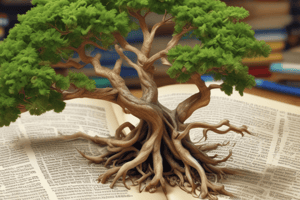Podcast
Questions and Answers
When narrowing your focus for a lesson, what is an example from a French class?
When narrowing your focus for a lesson, what is an example from a French class?
Vocabulary words starting with the letter F
What could be a narrowed focus for a science lesson?
What could be a narrowed focus for a science lesson?
List of noble gases
Provide an example of narrowing focus for a science lesson related to biology.
Provide an example of narrowing focus for a science lesson related to biology.
Demonstrating the process of photosynthesis
What are some examples of noble gases?
What are some examples of noble gases?
What is the process demonstrated in the context - photosynthesis?
What is the process demonstrated in the context - photosynthesis?
What does focus refer to?
What does focus refer to?
Which type of focus involves maintaining concentration over a prolonged period of time?
Which type of focus involves maintaining concentration over a prolonged period of time?
Name one factor that can impair focus.
Name one factor that can impair focus.
________ can help reduce distractions and improve focus.
________ can help reduce distractions and improve focus.
Match the brain regions with their focus-related functions:
Match the brain regions with their focus-related functions:
Flashcards are hidden until you start studying
Study Notes
Narrowing Focus in Learning
- When studying a subject, it's essential to narrow down your focus to a specific topic or aspect to facilitate deeper understanding and retention.
- This approach helps to avoid feeling overwhelmed by the vast amount of information and enables you to concentrate on a particular area of interest.
- Examples of narrowed focus in different subjects include:
- French class: focusing on vocabulary words that start with the letter F, or learning how to conjugate "re" verbs.
- Science lesson: studying a list of noble gases, or understanding the process of photosynthesis.
- By narrowing your focus, you can delve deeper into the subject matter, explore its intricacies, and develop a more comprehensive understanding of the topic.
Narrowing Focus in Learning
- In a French class, a narrowed focus could be learning vocabulary words that start with a specific letter, such as F.
- Another example of a narrowed focus in a French class is learning how to conjugate a specific type of verb, such as "re" verbs.
- In a science lesson, a narrowed focus could be learning about a specific group of elements, such as the noble gases.
- Alternatively, a narrowed focus in a science lesson could be understanding a specific process, such as photosynthesis.
What is Focus?
- Focus is the concentration of attention on a particular task, object, or idea, involving selectively directing awareness and mental resources towards a specific stimulus or goal.
Types of Focus
- Selective focus is the ability to concentrate on a particular stimulus or task while ignoring irrelevant information.
- Sustained focus is the ability to maintain concentration over a prolonged period of time.
- Alternating focus is the ability to switch focus between multiple tasks or stimuli.
Factors Affecting Focus
- Motivation improves focus and concentration when high.
- Interest in the task or subject matter improves focus.
- Fatigue, whether physical or mental, impairs focus.
- Distractions, such as noise or social media, negatively impact focus.
Strategies for Improving Focus
- Setting clear goals improves focus and motivation.
- Prioritizing tasks reduces distractions and improves focus.
- Effective time management minimizes distractions and improves focus.
- Mindfulness techniques, such as meditation, improve focus and reduce mind-wandering.
Brain Regions Involved in Focus
- The prefrontal cortex is responsible for executive functions, including attention and focus.
- The parietal cortex is involved in attentional control and focus.
- The basal ganglia are involved in movement and cognition, including attention and focus.
Studying That Suits You
Use AI to generate personalized quizzes and flashcards to suit your learning preferences.



